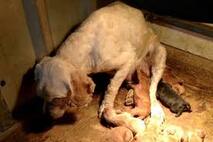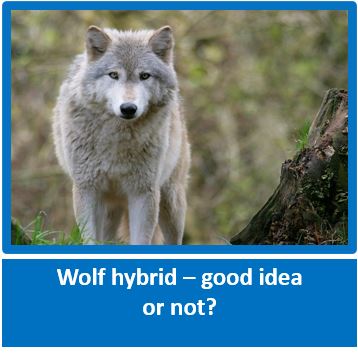
If you decide on a mixed breed, do consider having its DNA tested to establish what breeds make up your mixed dog actually is. Testing has multiple benefits such as health aspects to be aware of, possible behaviour issues, how best to entertain your dog, how much exercise is needed, possible social concerns with dogs and people, and of course, satisfy your curiosity. Knowing the breeds, really will help you to figure out why your dog does the things he does. Easy to do, done in the comfort of your home, and non invasive. Do visit us to find out more, or contact us if you have any questions.
As the saying goes ‘the buck stops with you’ - if you don’t do your homework and ensure that the pup you are going to get is from a totally committed, registered breeder, not only could you end up with a pup with potential health and genetic problems, possible behaviour concerns, not the breed it is meant to be – you will just have reinforced the breeding of pups from possible puppy farmers. It is, unfortunately OUR responsibility to do our home (dog) work before we part with our hard earned cash.
 Pic - Maxine
Pic - Maxine
Unfortunately, in SA we have the very real situation that far too many people are using the breeding of puppies to supplement their income – some of these ‘breeders’ have found this practice so lucrative that they have become full time breeders.
Here are some tips that should always be borne in mind before buying a purebred pup. Remember this pup could be with you for well over 15 years, will be a member of your family - especially important when you have babies or young children, either living with you or visiting, and it is up to you that you find the very best available. Of course a pup coming from a committed breeder will be more expensive - it has been properly looked after, the mom will have been vaccinated - been checked for positive genetic problems - have received all vaccinations - the correct care etc.
If you are not prepared to pay the price for the best on offer to become a member of your family, then rather than support unethical breeders, look at getting a pup from a breed rescue that may have pups available, or support your local shelter - there are hundreds of pups available. Many people believe that a pup adopted from a shelter is blow par - rather the truth is that many pups available from unethical breeders that are often puppy farmers are likely to be below par, prone to genetic defects, may not be the breed they are meant to be, not be in the best of health - the Nature side of breeding has not bee considered in the way it should be.
Here are some questions to ask the 'breeder' before you consider taking a puppy.
When getting a pup from a reputable breeder, you are often entering into a relationship which will ask the lifetime of your pup. The breeder should know his breed inside out as the saying goes, be there for you to ask questions, and will probably want to know how his pup gets on, will want to be kept abreast of any health or behaviour problems that may occur.
Most reputable breeders will actually interview you to ensure that you are the best home for his pups. He will want to know what arrangements you have made to have the pup at puppy school and what arrangements are made, especially in the first few months, as to the daily care of the pup.
Here are some tips that should always be borne in mind before buying a purebred pup. Remember this pup could be with you for well over 15 years, will be a member of your family - especially important when you have babies or young children, either living with you or visiting, and it is up to you that you find the very best available. Of course a pup coming from a committed breeder will be more expensive - it has been properly looked after, the mom will have been vaccinated - been checked for positive genetic problems - have received all vaccinations - the correct care etc.
If you are not prepared to pay the price for the best on offer to become a member of your family, then rather than support unethical breeders, look at getting a pup from a breed rescue that may have pups available, or support your local shelter - there are hundreds of pups available. Many people believe that a pup adopted from a shelter is blow par - rather the truth is that many pups available from unethical breeders that are often puppy farmers are likely to be below par, prone to genetic defects, may not be the breed they are meant to be, not be in the best of health - the Nature side of breeding has not bee considered in the way it should be.
Here are some questions to ask the 'breeder' before you consider taking a puppy.
When getting a pup from a reputable breeder, you are often entering into a relationship which will ask the lifetime of your pup. The breeder should know his breed inside out as the saying goes, be there for you to ask questions, and will probably want to know how his pup gets on, will want to be kept abreast of any health or behaviour problems that may occur.
Most reputable breeders will actually interview you to ensure that you are the best home for his pups. He will want to know what arrangements you have made to have the pup at puppy school and what arrangements are made, especially in the first few months, as to the daily care of the pup.
- May I come and meet the mom and pups? If no, walk away. This is the only guarantee that the mother and pups are kept in the correct conditions.
- If the breeder says pups can be viewed but not the mother - walk away. This is where you will see what your pup will end up like, what the mom's personatily is like etc and there is absolutely no reason why she cannot be viewed, unless a potential problem that the breeder does not want you to know about.
- Seeing and meeting the father is not always an option, as many breeders will send their bitches to be covered by another breeders male dog. However, do ask if you can go and see the father and interact with him.
- The premises should be clean with the existing dogs looking happy and well fed and excellent physical condition. Do bear in mind, that having given birth, the mom may be a bit thinner than normal. The pups should all be in excellent health, have that lovely puppy smell, have no fleas, discharge from ears, signs of a runny tummy, discharge from the eyes etc.
- Ask if the mother has registeration papers with a well known breed registration body. If yes, dont just leave it there, get the registration number and phone for confirmation. There have been many cases of fraud in the past, and the onus is on you to check.
- Ask if the mother have been vaccinated and ask to see the certificate. If breeder supplies a copy of same, then check if the vacs have been stamped by one of the local vets. If no certificate, or breeder has signed and stamped the vac certificate himself - walk away.
- Ask if the pup has had its first set of vaccinations. If yes, as above ask to see them with the same criteria. Pups should receive their first vaccinations at 6 weeks of age and any reputable breeder will ensure that his previous pups have been covered.
- Ask at what age do the pups go up for adoption. If under 8 weeks of age - walk away. The period 5 - 8 weeks is a critical time for pups and where they will build an early and solid foundation for future social skills. The pups start to play amoung themselves, they learn to understand dog social language (body language), will figure out what behaviours work and what dont. Mom normally starts to dole out disclipline during this period as well, and pups will learn self confidence.
- Find out about the genetic problems that tend to relate to your chosen breed, and then ask the breeder is the mother is certified free from these genetic problems - as to see the certificate.
- Good breeders normally have the pups certified clear of genetic defects - ask to see the certificates.
- Ask what the breeders reason is for breeding and how long they have been breeding.
- Ask how many dogs they are breeding, and how many pups they have for you to view. A committed breeder normally only has one litter at a time, and very often will not breed until they have the right owners for one of their precious pups.
- The reputable breeder will ask you to sign a contract and this contract should offer a health guarantee that the pup is free from genetic defects up to the age of one year old. With a reputable breeder, if problems do develop, they will often offer to replace the pup with one that has been recently bred. Ask to see a copy of the standard contract to see what is covered.
- Ask the breeder about sterilization, especially if getting a male pup. A reputable breeder will insist on sterilization at approximately 6 months of age and this is often in your contract, unless you are going to be showing the dog yourself.. If the breeder says that offering you the best of the litter and will contact you when pup older to use for breeding - walk away - no breeder worth his salt will every sell the best of the litter. He will use for himself, or sell to another breeder.
- Find out if the puppy has been microchipped. If pup is KUSA registered, they is a condition that has to be met.
- Most reputable breeders contracts stipulate that the pup is returned to them if anything happens that you cannot keep the pup at any stage.
- Many reputable breeders will have had their pups termperment tested to ensure that they know which home would suit best.
- Look at the breeders website and see if they take part in dog shows of any type. A sub standard dog is not likely to be viewed at any of these.
- Ask what socialization has been/is being done with the puppies. Early socialization with a pup meeting different people, being part of the home environment, receiving early stimulation is an important aspect to consider.

Puppy mills are big, big business. As many as 10,000 unlicensed breeding operations exist in the United States alone, unfortunately we could not find stats for SA.
Very often the pups and their mothers are kept in horrific conditions, often in cages and on occassion, a registered breeder can actually be a puppy farmer - you HAVE to do your own investigations.
Unfortunately in virtually every ‘business’ in society, there are always those that become greedy, such as the case of the Roodewal Kennels debacle – Roodewal Kennels were registered with KUSA, had been in business for years and were supposedly top breeders. The reality was that the owner was contracting with many other breeders to supply the pups, and many of these were sick and died after a few days, or hereditary defects began to show up – and when the situation was investigated, the moms and pups were kept in horrific conditions. Here is the link to find out more, and please remember that the onus is on the potential purchaser to do their homework before buying.
https://www.schnauzerfriendsza.com/about-roodewal-kennels.html
Signs that the breeder you are considering could be bad news
https://www.ipata.org/current-pet-scamshttps://www.ipata.org/pet-scams
Very often the pups and their mothers are kept in horrific conditions, often in cages and on occassion, a registered breeder can actually be a puppy farmer - you HAVE to do your own investigations.
Unfortunately in virtually every ‘business’ in society, there are always those that become greedy, such as the case of the Roodewal Kennels debacle – Roodewal Kennels were registered with KUSA, had been in business for years and were supposedly top breeders. The reality was that the owner was contracting with many other breeders to supply the pups, and many of these were sick and died after a few days, or hereditary defects began to show up – and when the situation was investigated, the moms and pups were kept in horrific conditions. Here is the link to find out more, and please remember that the onus is on the potential purchaser to do their homework before buying.
https://www.schnauzerfriendsza.com/about-roodewal-kennels.html
Signs that the breeder you are considering could be bad news
- Advertises his pup on free internet websites.
- Offers pups for sale at flea markets, local newspapers and of course pet shops.
- Will deliver the pup to you, or offers to meet you somewhere to hand over the pup.
- You cannot meet the mom and pups.
- Does not offer a contract.
- Does not offer papers from a reputable breed registration organization.
- Does not offer proof health certificates.
- They are selling the pups at a discounted price, or are much cheaper than a pup on offer from a KUSA registered breeder for example. If you cant afford the best, then as said previously, rather support a shelter.
- Some puppy farmers will offer two pups for just over the price of one - walk away - a good breeder will never suggest taking two pups of the same, or similar age. There are multiple drawbacks to this - read https://www.friendsofthedog.co.za/double-trouble.html
- If going to the premises you find that there are multible litters on offer - walk away - this is possibly a puppy farm.
- If you see mothers that are either too young or too old - walk away.
- They do not offer references
- They do not ask you questions about about your own lifestyle, where pup will be kept etc.
- The breeder offers multiple different breeds for sale or “rare” or “new” breeds.
- The person claims they are selling the puppies as an “agent” for a breeder.
https://www.ipata.org/current-pet-scamshttps://www.ipata.org/pet-scams
KUSA Registered breeders and pups
If you really want a top bred registered pup, then one that is registered by KUSA is your best bet. However, as per their website :
"The Kennel Union cannot guarantee that dogs registered with the Kennel Union or their progeny are free from any inheritable or congenital defects or guarantee the standard of performance. The Kennel Union serves as a registry for purebred dogs and is a voluntary association of its members. The Kennel Union does not register breeders and has no legistrive powers to adudicate between parties in dispute over the purchase & sale of puppies."
KUSA can guarantee the registration aspect, however they do not visit breeders to inspect premises, and cannot guarantee that the dog has been bred to have the best personality as pertains to the actual breed.
If you really want a top bred registered pup, then one that is registered by KUSA is your best bet. However, as per their website :
"The Kennel Union cannot guarantee that dogs registered with the Kennel Union or their progeny are free from any inheritable or congenital defects or guarantee the standard of performance. The Kennel Union serves as a registry for purebred dogs and is a voluntary association of its members. The Kennel Union does not register breeders and has no legistrive powers to adudicate between parties in dispute over the purchase & sale of puppies."
KUSA can guarantee the registration aspect, however they do not visit breeders to inspect premises, and cannot guarantee that the dog has been bred to have the best personality as pertains to the actual breed.




